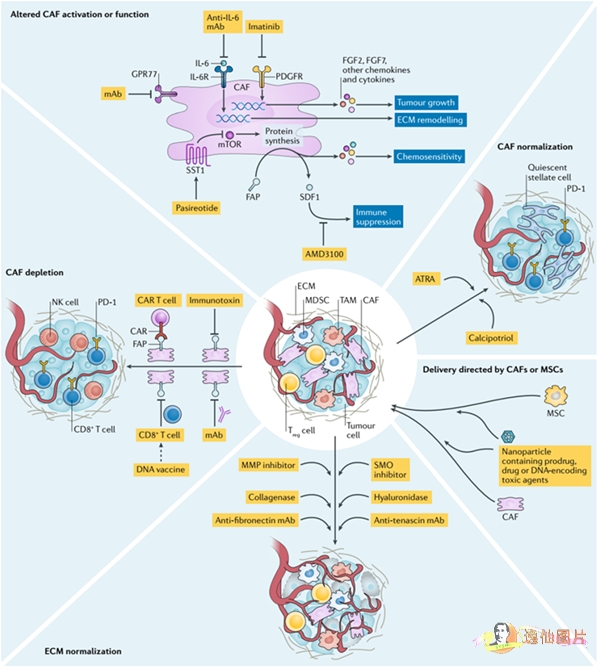Nature Reviews Drug Discovery: targeting cancer-associated fibroblasts
Recently, a Review Article entitled “Turning foes to friends: targeting cancer-associated fibroblasts”was published online in Nature Reviews Drug Discovery(IF 2018=50.17)1. Professor Erwei Song, President of Sun Yat-sen Memorial Hospital, Sun Yat-sen University, is the corresponding author, and Xueman Chen, a PhD student from his team, is the first author.
Current paradigms of cancer-centric therapeutics are usually not sufficient to eradicate the malignancy, as the cancer stroma may prompt tumor relapse and therapeutic resistance. In the past decade, a burst of knowledge on how the tumor microenvironment (TME) interacts with tumor cells has urged studies on a new cancer treatment paradigm: targeting the tumor stroma. Among all the stromal cells that populate the TME, cancer-associated fibroblasts (CAFs) are the most abundant and are critically involved in cancer progression, which render them as conspicuous stromal targets in many, if not all, solid tumors. However, without unequivocal cell-surface markers, live-cell sorting for functional and mechanistic studies on CAFs in vitro and targeting therapies towards CAFs in vivo are greatly hindered.
It is noteworthy that a previous research from Prof.Erwei Song’s teamrevealedCD10and GPR77 as two specific cell-surface makers for a novel pro-tumorigenic CAF subset involved in cancer stemness and chemoresistance2. More importantly, GPR77 is a functional marker which can be directly targeted for in vivo CAF depletion. The restoration of chemosensitivity of tumor cells upon GPR77 blockade further suggests the remarkable therapeutic value of such a precise CAF-targeted strategy for cancers.

Accumulated molecular characterization of CAFs not only deepens our insights into their phenotypic heterogeneity and functional diversity, but also brings CAF-targeting therapies for cancer treatment onto the agenda. However, translating the basic research into clinical practice takes tremendous efforts and is extremely time-consuming, which makes it an urgent need for therapists and drug developers to comprehensively recognize the functional significance and molecular mechanisms of CAFs in cancers.
In this Review, Prof. Song’s team presented a full-scale overview regarding the current understanding of the hallmarks, biology and heterogeneity of CAFs, highlighting the CAF-centered intercellular crosstalk within the TME, and discussed multipronged functions of CAFs in tumor initiation, progression, metastasis and resistance to anticancer therapies. Prof. Song’s team also elaborated on the potential therapeutic strategies targeting CAFs, with an aim to accelerate the leap from bench to bedside.

References
1. Chen, X. & Song, E. Turning foes to friends: targeting cancer-associated fibroblasts. Nature reviews. Drug discovery (2018).
2. Su, S., et al. CD10(+)GPR77(+) Cancer-Associated Fibroblasts Promote Cancer Formation and Chemoresistance by Sustaining Cancer Stemness. Cell (2018).
Links to the article:www.nature.com/articles/s41573-018-0004-1
Written by: Xueman Chen
Edited by: the Office of International Affairs,Administration Department


